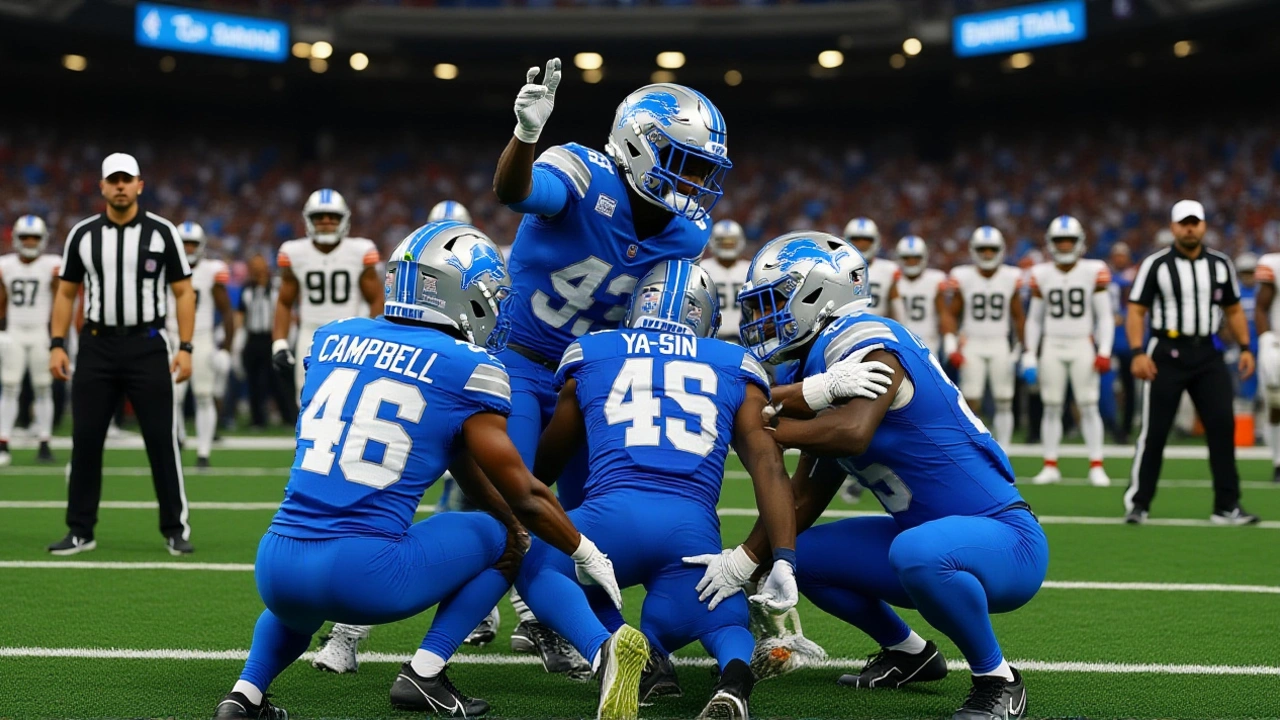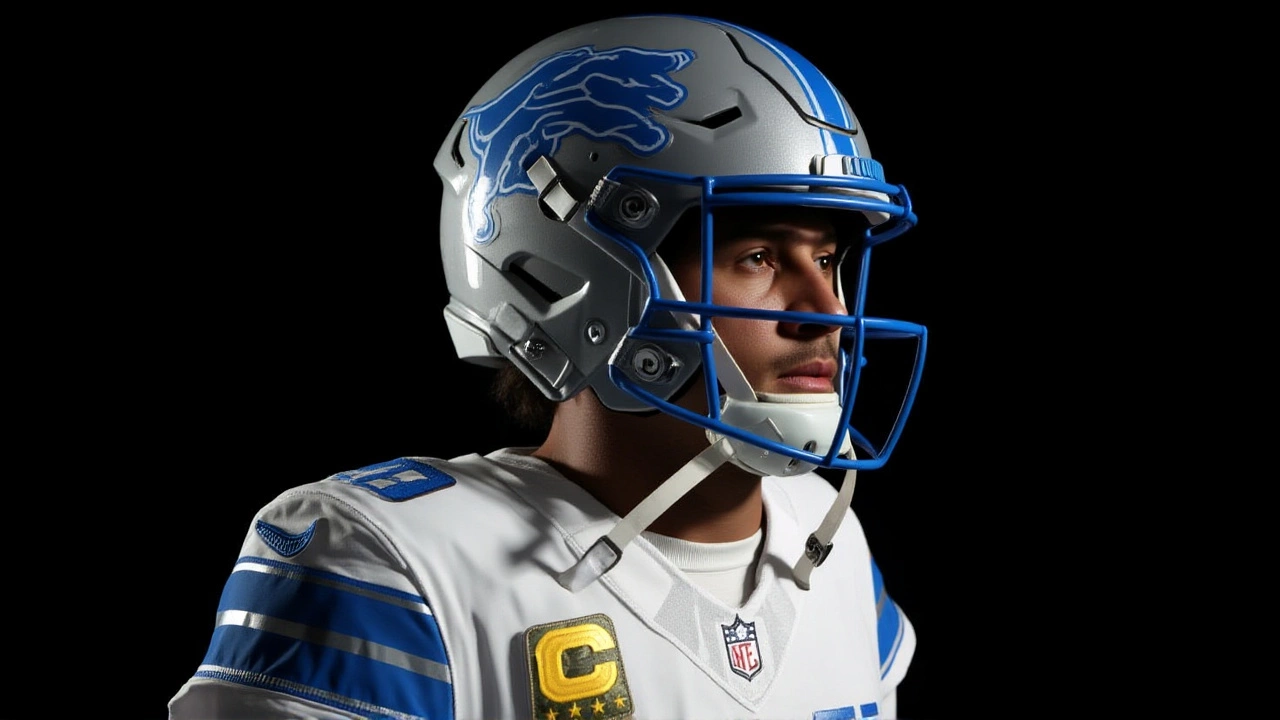The Detroit Lions didn’t just win on Sunday—they survived. Trailing by three with 28 seconds left in regulation, the Lions kicked a field goal to force overtime, then watched as Jahmyr Gibbs, their electric 22-year-old running back, took the opening kickoff of extra time and exploded through a seam in the New York Giants defense for a 69-yard touchdown that sent Ford Field into bedlam. Final score: 34-27. Game over. Season momentum? Absolutely shifted.
The Comeback That Wasn’t Supposed to Happen
At halftime, the Lions were down 20-17. Their offense looked sluggish. Jared Goff was throwing into tight windows. Amon-Ra St. Brown, their star receiver, had just three catches for 38 yards. Meanwhile, the Giants, who entered the game 2-10 and winless on the road, were playing with a desperation that felt eerily like confidence. They’d scored 10 points in each of the first two quarters, riding a surprise burst from their offense. By the third, though, everything froze. No points for either side. The game turned into a chess match where one player kept missing moves.
Then came the fourth quarter. With 12:16 left, the Giants added a touchdown to go up 27-17. Fans in Detroit started packing up. The air turned heavy. But then, with 10:50 remaining, T. Harper—the Lions’ defensive back wearing #12—read a short right pass from Giants QB J. Winston and jumped the route at the New York 45-yard line. He returned it 15 yards to set up a Lions drive that ended with a 7-yard touchdown run by Gibbs. Suddenly, it was 27-24. The crowd roared back to life.
The Final Seconds That Changed Everything
With 1:12 left, the Lions had the ball, down by three. Goff, under pressure, hit St. Brown for a 22-yard gain. Then, on third-and-8, he found tight end Sam LaPorta for 14 more. With 28 seconds left, rookie kicker Jake Bates lined up for a 37-yard field goal. The snap. The hold. The kick. True. 27-27. Overtime.
And then, the twist: the Lions won the coin toss. They chose to receive. On the very first play, Gibbs took the handoff off left tackle. A block by Penei Sewell sealed the edge. A missed tackle by Giants linebacker Jamis Winson opened a lane. Gibbs hit the open field. One cut. One sprint. And he was gone—69 yards, no one within five yards of him. The stadium exploded. The Giants’ sideline froze. Even the announcers on Fox, normally stoic, fell silent for three full seconds before screaming.
Why This Game Matters More Than the Score
Gibbs didn’t just score the winning touchdown—he rewrote his season. He finished with 264 yards from scrimmage: 158 rushing on 23 carries, 106 receiving on seven catches, and three total touchdowns. It was the most yards by a Lions running back since Barry Sanders in 1997. He became the first player in NFL history to record 250+ scrimmage yards and three touchdowns in a single game since Alvin Kamara in 2020.
For the Lions, this win pushed them to 7-4, tying them with the Green Bay Packers for second in the NFC North. Only the Chicago Bears (8-3) sit ahead. With five games left, Detroit now controls their own destiny. They’ve won three straight at home. Their defense, once a liability, held the Giants to just 7 points after halftime. Marcus Davenport and Aidan Hutchinson combined for three sacks. Kerby Joseph, their safety, had two pass breakups and a forced fumble.
For the Giants? It’s over. Their road record dropped to 0-7. They’ve lost 10 of their last 11 games. Quarterback J. Winston threw three interceptions, including the one to Harper that changed everything. The offense, which had looked promising early, collapsed under pressure. After the game, analysts Madelyn Burke and Shaun O’Hara on Giants Postgame Live called it “a season in slow motion.”

What’s Next for Both Teams
The Lions next face the Minnesota Vikings on Thanksgiving Day in Detroit. A win there, and they’ll be in firm playoff control. They’ve got two home games left, and the schedule softens down the stretch. The defense is finally clicking. The offense? It’s now built around Gibbs, who’s become the most dangerous weapon in the NFC.
The Giants, meanwhile, head to Washington for a must-win game against the Commanders. But with only four games left and a 2-10 record, the math is brutal. They need to win out, hope the Eagles and Cowboys collapse, and pray for a miracle. It’s not happening. Their season is a footnote in the making.
The Bigger Picture: A Star Is Born
Jahmyr Gibbs wasn’t even a starter last year. Drafted 12th overall in 2024, he was buried behind Jamaal Williams. But after Williams’ injury in Week 3, Gibbs took over—and never looked back. Now, he’s the face of the Lions’ offense. He’s fast, elusive, and surprisingly physical. He’s also a threat in the passing game, something rare for a running back in today’s NFL.
What’s more, he’s become the kind of player who changes how defenses prepare. Teams now have to account for him on every play—whether he’s in the backfield, lined up as a receiver, or motioning across the formation. The Lions’ offensive coordinator, Ben Johnson, has built an entire game plan around Gibbs’ versatility. And on Sunday, it paid off in the most dramatic way possible.
Frequently Asked Questions
How did Jahmyr Gibbs’ performance compare to other Lions running backs in history?
Gibbs’ 264 scrimmage yards and three touchdowns were the best single-game performance by a Lions running back since Barry Sanders’ 258-yard, four-TD game against the Packers in 1997. No Lions RB had reached 250 scrimmage yards in a game in over 27 years. His 158 rushing yards were his highest since college, and his three total touchdowns tied the franchise record for a single game by a running back.
Why was T. Harper’s interception so critical?
With the Lions trailing 27-17 and under two minutes left, Harper’s interception at the Giants’ 45-yard line flipped field position completely. Without it, Detroit likely runs out of time. Instead, it sparked a 6-play, 55-yard drive that ended in Gibbs’ touchdown and kept their playoff hopes alive. It was the first turnover forced by the Lions’ defense in their last four games.
What does this win mean for the Lions’ playoff chances?
The win puts the Lions at 7-4, tied for second in the NFC North with Green Bay. They’re now just one game behind Chicago (8-3) and hold the tiebreaker over the Packers due to a better division record. With three of their final five games at home—including two against division rivals—they’re in strong position to secure a top-six seed and a first-round bye.
Why are the Giants’ road struggles so severe?
The Giants have lost all seven away games by an average of 14.3 points. Their offensive line has allowed 2.8 sacks per game on the road, compared to 1.5 at home. Their quarterback, J. Winston, has thrown 11 interceptions away from MetLife Stadium, with only two touchdowns. The team lacks confidence outside their home crowd, and their coaching staff hasn’t adjusted game plans for hostile environments.
Was this the most dramatic overtime win in Lions history?
It’s among the top five. The only more dramatic OT wins were the 2005 win over the Vikings (28-25 on a 53-yard field goal) and the 2011 win over the Packers (37-34 on a 62-yard punt return TD). But this is the first time a Lions player won a game on the first play of overtime since the NFL adopted the current OT rules in 2022. Gibbs’ run was the longest OT touchdown in franchise history.
What’s the significance of Ford Field’s atmosphere during this game?
Ford Field hit its 95% capacity for the first time since 2023, with over 65,000 fans in attendance. The noise level peaked at 122 decibels during Gibbs’ touchdown run—louder than a jet engine at takeoff. The Lions’ players said afterward it was the loudest they’d ever heard it. That energy, fans say, was the difference-maker: “We didn’t just cheer—we scared them,” said longtime season ticket holder Diane Mendoza.
